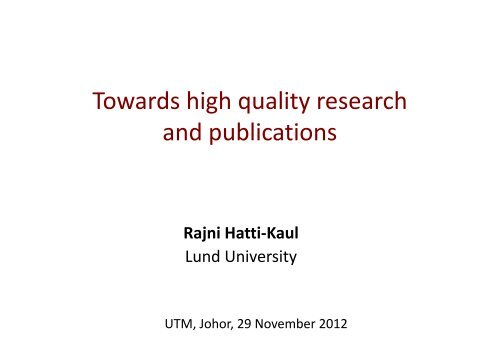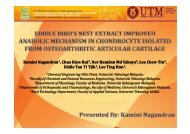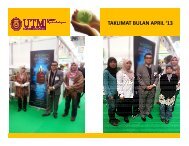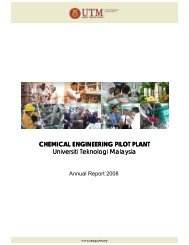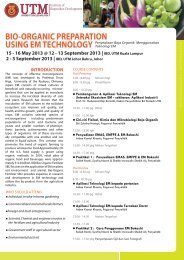Prof Dr. Rajni Hatti-Kaul Public Lecture - UTM
Prof Dr. Rajni Hatti-Kaul Public Lecture - UTM
Prof Dr. Rajni Hatti-Kaul Public Lecture - UTM
Create successful ePaper yourself
Turn your PDF publications into a flip-book with our unique Google optimized e-Paper software.
Towards high quality research<br />
and publications<br />
<strong>Rajni</strong> <strong>Hatti</strong>-<strong>Kaul</strong><br />
Lund University<br />
<strong>UTM</strong>, Johor, 29 November 2012
Requirements for high quality research<br />
• Infrastructure for performing research<br />
• Capable ”driver” of research<br />
• A good team<br />
• A good network
Quality measures for excellence<br />
• Impact factor<br />
• Number of publications<br />
• Citation frequency<br />
• h-factor
Research funding in Sweden<br />
• Externally funded<br />
• Obtaining grants highly competitive<br />
• Trendy areas<br />
• Trend towards larger projects - Interdisciplinarity<br />
• Project leader as a scientist and manager<br />
• Impact factor of the journals and citation index<br />
play important role<br />
• Open access journals in increasing demand
PhD education in Sweden<br />
• 4 years research work and courses (40 weeks)<br />
• Minimum requirement: 4 papers out of which<br />
at least 2 should be published or accepted for<br />
publication in international peer reviewed<br />
journals<br />
• Thesis: summary with papers
A good researcher<br />
asks the question ”why”
Literature<br />
Problem<br />
Filling<br />
the<br />
gap<br />
Need<br />
Understanding<br />
Filling<br />
the<br />
gap<br />
Literature
From idea to product<br />
Idea<br />
Work<br />
Product –<br />
Paper, patent<br />
Hot topic or a crazy idea<br />
Do good homework!<br />
• Facilities<br />
• Required<br />
manpower<br />
• Patentable<br />
• How much to reveal in<br />
publication
Best ways to get ideas and follow global trends<br />
• Reading – information readily available today<br />
• Attend conferences<br />
• Discussions with colleagues<br />
• Journal clubs – choose high impact journals
Novelty of research is the prime factor for high<br />
quality research<br />
• Can you be the first one to report a finding<br />
• Even if you want to work in an area that is<br />
popular, start with finding out what is already<br />
known<br />
• Thorough review of literature<br />
• No point in repeating what is already<br />
published<br />
• Take the published work as a starting point<br />
and look for the knowledge gaps
Duties of researchers in a university<br />
Third task<br />
Demonstration<br />
Communication<br />
Teaching<br />
Research<br />
Increasing and conveying knowledge
Balance between research excellence and<br />
contribution to society<br />
• Difficult<br />
• More you move towards using your research<br />
for the benefit of society the lower becomes<br />
the novelty and impact of publications<br />
• Useful to have two parallel tracks – research<br />
and application<br />
• Alternatively find a side track for continuing<br />
research at a high level
Example of impact factors as the work progresses<br />
• S-H Pyo, P Persson, S Lundmark and R <strong>Hatti</strong>-<strong>Kaul</strong> (2011) Solvent-free lipasemediated<br />
synthesis of six-membered cyclic carbonates from trimethylolpropane<br />
and dialkylcarbonates. Green Chemistry 13, 976-982 (IF: 6.32)<br />
• S-H Pyo, K Nuszkiewicz, P Persson, S Lundmark and R <strong>Hatti</strong>-<strong>Kaul</strong> (2011)Lipasemediated<br />
synthesis of six-membered cyclic carbonates from trimethylolpropane<br />
and dialkyl carbonates: influence of medium engineering on reaction selectivity. J.<br />
Mol. Catal. B: Enzymatic 73, 67-73 (IF: 2.701)<br />
• A Bornadel, R <strong>Hatti</strong>-<strong>Kaul</strong>, K Sörensen, S Lundmark and S-H Pyo (2012)Optimization<br />
of a two-step process comprising lipase catalysis and thermal cyclization improves<br />
the efficiency of synthesis of six-membered cyclic carbonate from<br />
trimethylolpropane and dimethylcarbonate. Biotechnology Progress In press (IF:<br />
2.34)<br />
• S-H Pyo and R <strong>Hatti</strong>-<strong>Kaul</strong> (2012) Selective, green synthesis of six-membered cyclic<br />
carbonates by lipase catalysed regio-specific transesterification of diols with<br />
dimethylcarbonate. Advances in Synthesis and Catalysis 354, 797-802 (IF: 6.048)
DISCUSSION
Remember that you are on a global<br />
scene when you are publishing in<br />
an international journal<br />
– even if you are working on a<br />
problem of national importance
Kind of publications<br />
• Original papers<br />
• Rapid communications<br />
• Reviews<br />
• Book chapters<br />
• Books<br />
Potentially high<br />
impact and<br />
citation More frequency widely read<br />
Meritorious<br />
Time consuming
Journals for different research areas have<br />
varying impacts<br />
• Fundamental research > applied research<br />
• Molecular biology > fermentation<br />
• Polymer technology > biotechnology<br />
• Material science > chemical science<br />
• Nanotechnology<br />
• Biomedical - Tissue engineering, <strong>Dr</strong>ug delivery
Give equal importance to writing as to the<br />
laboratory work<br />
Good results not communicated well dont<br />
make a good publication
Prior to writing<br />
• Put together all your data and evaluate it<br />
• Are you confident of your data<br />
• Or is there some experiment that needs to be<br />
repeated<br />
• Do you have standard errors of deviation wherever<br />
required<br />
• Is there something missing to make it a complete<br />
story<br />
• Do you have the facilities to perform the missing work<br />
or can you collaborate with someone or outsource it
Choosing the journal<br />
• Short list a few journals that fit your work<br />
• Check their impact factors<br />
• Open access journals<br />
• Check the papers published in them and their<br />
quality<br />
• If possible get information on how fast they<br />
are in processing the papers
Writing a paper<br />
- is like telling a story. Make it interesting and<br />
convincing<br />
Keep the literature up to date when starting to write the paper<br />
You may sometimes be surprised<br />
• Introduction<br />
• Materials and methods<br />
• Results and Discussion (or Results followed by<br />
Discussion)
Writing skills<br />
• We are all not gifted writers<br />
• Reading and practicing is the best way to<br />
improve writing skills<br />
• Linguistic skills can also be acquired, possible<br />
to get language corrected<br />
• No plagiarism - Do not copy directly from a<br />
published source or internet. Form it in your<br />
own words
How I write the paper …<br />
1. Materials and methods<br />
• The easiest part since you know what you have<br />
done<br />
• Start writing the paper with this section with all<br />
experimental details and required references
2. Results<br />
• Write the results you have obtained along<br />
with the figures<br />
• The data should show standard errors of<br />
deviation wherever possible<br />
• Dont put too many figures and tables<br />
• Lot of optimization results can be given as<br />
supplementary data
3a. Introduction<br />
• Provide a good background of the field<br />
• Add enough references – better more than<br />
less<br />
• Set a ground for your work<br />
• Finally, define the objectives of your work<br />
clearly
3b. Discussion<br />
• The most difficult and also the most interesting part of<br />
the paper<br />
• Provide logical explanation/theory for the data<br />
obtained. Refer to papers with similar observations.<br />
• If you can confirm your theory, do that. Dont speculate<br />
too much<br />
• Compare your data with the literature reports<br />
• Highlight the novelty<br />
• If Discussion is separated from Results, dont repeat the<br />
results – only discuss them
4. Conclusions<br />
• This is not a summary!<br />
• State briefly what the findings are from the study.<br />
HIGHLIGHTS!<br />
• Write also the challenges if necessary<br />
• Suggestion on how the work should be continued<br />
or if you are already doing something
5. Abstract<br />
• Just a summary of what the paper is about.<br />
• Introduce the subject in the first sentence (or<br />
two) to lay a ground for why the study is<br />
important<br />
• Then some sentences on what was done and<br />
the observations<br />
• Perhaps a final sentence indicating the novelty
This is what I tell my students<br />
After the first draft<br />
• Be critical on your own writing<br />
• Remember the paper should be improved<br />
continuously for language, discussion, introduction,<br />
etc.<br />
• Take a pause for a couple of days after writing the<br />
first draft.<br />
• Ask your colleagues to read the paper and give<br />
honest comments<br />
• Keep sending back and forth to your supervisor for<br />
continuous improvement and polishing (5-10 times)<br />
You should feel proud of the paper you produce
<strong>Public</strong>ations – view of a reviewer
Accepting to review<br />
• Interesting subject<br />
• Close to my area of work<br />
• Abstract<br />
• Journal
Presentation<br />
• Language<br />
• Following the journal format<br />
• Abstract<br />
• Keywords<br />
• Quality of figures and tables<br />
• Research highlights
Introduction<br />
• Has sufficient background literature been<br />
provided in the Introduction<br />
• Have the objectives been clearly stated<br />
• Are the objectives significant, novel
Materials and methods<br />
• Is the description of methods given in<br />
sufficient detail and with appropriate<br />
references<br />
• Are the methods used suitable and sufficient<br />
for fulfilling the objectives
Results & Discussion<br />
• Most crucial part<br />
• Do the results add significantly to new<br />
knowledge<br />
• Are the claims supported by data<br />
• Is the work complete
Recommendation<br />
Accept/Minor revision<br />
• Short review<br />
Major revision/Reject<br />
• Detailed review with all the<br />
points that need to be<br />
improved
To improve the standard of publications<br />
• Monetary award for publications in journals of<br />
certain impact factor<br />
• Evaluation of research and staff by an international<br />
committee and get their recommendations<br />
• Sending staff and students to international<br />
laboratories for short periods (6 months)<br />
• Facilitate purchase of chemicals and equipment<br />
and their maintenance
Thank you for your attention<br />
& good luck!


